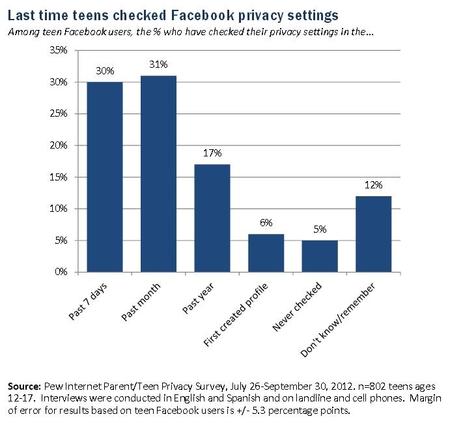Teens, Social Media & Privacy close
In

There’s a huge amount of supposition in the digital industry that teens do not really consider their privacy on the internet and equally have a disregard for their future professional reputation online. A recent study by Pew Research Center tackled this subject and actually surfaced some rather contrarian results to these commonly held beliefs.
The findings are based on a survey of 802 American teens aged 12-17 and their parents. What emerges is a portrait of teenagers who engage in a range of behaviors to manage the limitations of their “social privacy”. Although the survey was conducted in the USA only, the results indicate an overall trend on how the next generation of digital users thinks and operates.
Far from being privacy indifferent, results show that teens are mindful about what they post. Also, against public belief, most teenage facebook users checked their privacy settings relatively recently with 30% having checked them in the last 7 days and 31% in the last month.

Generally, most of their profiles are set to private. In particular girls are very likely to restrict access to their profiles, with 70% saying their profile is visible to friends only.

In general, most young users express a high level of confidence in managing their Facebook privacy settings. More than half of them say it is “not difficult at all” to manage privacy controls in social media. However, their primary focus is often their engagement with peers and family, rather than how third parties might access their data for advertising reasons.
While the majority of teenagers seem to connect “social privacy” with what content their friends and friends of friends can or cannot access on their profile, only a minority are aware that their shared content might be used by third parties. When asked whether they thought Facebook gives anyone else access to the information they share, one middle schooler answered:
“Anyone who isn’t friends with me cannot see anything about my profile except my name and gender. I don’t believe that [Facebook] would do anything with my info.”
Other high schoolers shared similar sentiments, believing that Facebook would not or should not share their information. As expected, parents show much greater levels of concern about how much information advertisers can learn about their children’s online behaviour.

On the other side, only 9% of teenagers are reported to be “very concerned” (31% say they are “somewhat concerned”) about third-party access to their data. Those who are, are also more likely to engage in online reputation management. 40% of teenagers frequently delete or edit something they posted in the past, delete comments that others have made on their profile and untag themselves in photos in order to ensure a positive online reputation. Also, more than half of online teenagers have refrained from sharing something on social media, because they were afraid it could reflect badly on them in the future.
Patterns of teen social media usage change with age and this has crucial implications for understanding the evolution of a teenager’s personal privacy strategy. While younger teens tend to have smaller networks and do not post frequently, older teens have amassed larger networks and interact with a wider range of people. Interestingly, the study found that youthful users associate a sense of social burden with Facebook. They sometimes feel it is a utility and an obligation, rather than an exciting social platform. Nevertheless, and contrary to claims such as “Facebook is dead”, the study found no indications of a mass exodus from Facebook.

For further information on this study, please access the full study here.